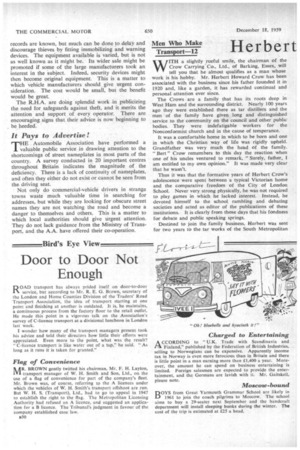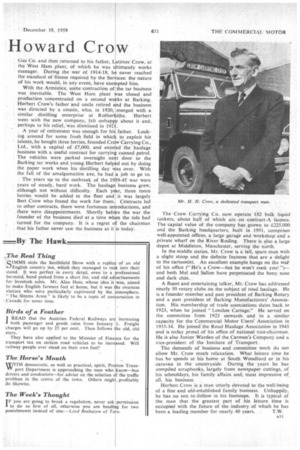Herbert Howard Cro
Page 36

Page 37

If you've noticed an error in this article please click here to report it so we can fix it.
WITH a slightly rueful smile, the chairman of the Crow Carrying Co., Ltd., of Barking, Essex, will tell you that he almost qualifies as a man whose work is his hobby. Mr. Herbert Howard Crow has been associated with the business since his father founded it in 1920 and, like a garden, it has rewarded continual and
personal attention ever since. .
The Crows are a family that has its roots deep in West Ham and the surrounding district. Nearly 100 years ago they were established there as tar distillers and the men of the family have given long and distinguished service to the community on the council and other public bodies. They were indefatigable workers for the Nonconformist church and in the cause of temperance.
It was a comfortable home in which to be born and one in which the Christian way of life was rigidly upheld. Grandfather was very much the head of the family. " Bert " Crow remembers to this day the reaction when one of his uncles ventured to remark, 'Surely, father, I am entitled to my own opinion." It was made very clear that he wasn't.
Thus it was that the formative years of Herbert Crow's adolescence were spent between a typical Victorian home and the comparative freedom of the City of London School. Never very strong physically, he was not required to play games in which he lacked interest. Instead, he devoted himself to the school rambling and debating societies and acted as editor of the publications of these institutions. It is clearly from those days that his fondness for debate and public speaking springs.
Destined to join the family business, Herbert was sent for two years to the tar works of the South Metropolitan Gas Co. and then returned to his father, Latimer Crow, at the West Ham plant, of which he was Ultimately works manager. During the war of 1914-18, h never reached the standard of fitness required by the Ser ices: the nature of his work would, in any event, have exe pted him.
With the Armistice, some contraction of the tar business was inevitable. The West Ham plant as closed and production concentrated on a second w ks at Barking. Herbert Crow's father and uncle retired nd the business was directed by a cousin, who, in 1920, merged with a similar distilling enterprise at Rother ithe. Herbert went with •the new company, felt unhappy about it and, perhaps to his relief, was dismissed in 192 A year of retirement was enough for hi father. Looking around for some fresh field in whic to exploit his
talents, he bought three lorries, founded Cr Carrying Co., Ltd., with a capital of £7,000, and ente ed the haulage business with a useful contract for carryin canned petrol. The vehicles were parked overnight ne t door to the Barking tar works and young Herbert help d out by doing the paper work when his distilling day as over. With the fall of the amalgamation axe, he had a job to go to.
The years up to the outbreak of the 19 9-45 war were years of steady, hard work. The haulag business grew, although not without difficulty. Each y r, three more lorries would be added to the fleet and it was largely Bert Crow who found the work for them. Contracts led to other contracts, there were fortunate in oductions, and there were disappointments. Shortly bef e the war the founder of the business died at a time wh n the tide had turned for the company. It is a regret o the chairman that his father never saw the business as it is today. The Crow Carrying Co. now operate 182 bulk liquid tankers, about half of which are on contract-A licence. The capital value of the company has grown to £225,000 and the Barking headquarters, built in 1951, comprises well-appointed offices, a large garage and workshop and a private wharf on the River Roding. There is also a large depot at Middleton, Manchester, serving the north.
In the middle sixties, Mr. Crow is a tall, spare man with a slight stoop and the definite features that are a delight to the cartoonist. An excellent example hangs on the wall of his office (" He's a Crow—but he won't rook you ")and both Mel and Sallon have perpetuated the bony nose and dark chin.
A fluent and entertaining talker, Mr. Crow has addressed nearly 50 rotary clubs on the subject of road haulage. He is a founder member and past president of Barking Rotary and a past president of Barking Manufacturers' Association. His membership of trade associations dates back to 1923, when he joined "London Cartage." He served on the committee from 1923 onwards and in a similar capacity for the Commercial Motor Users' Association in 1933-34. He joined the Road Haulage Association in 1945 and is today proud of his office of national vice-chairman. He is also Junior Warden of the Carmen's Company and a vice-president of the Institute of Transport.
The demands of business and committee work do not allow Mr. Crow much relaxation. What leisure time he has he spends at his home at South Woodford or in his caravan in the countryside. During the years he has compiled scrapbooks, largely from newspaper cuttings, of his schooldays, his family affairs and, most impressive of all, his business.
Herbert Crow is a man utterly devoted to the well-being of a fine and old-established family business. Unhappily, he has no son to-follow in his footsteps. It is typical of the man that the greatest part of his leisure time is occupied with the future of the industry of which he has been a leading member for nearly 40 years. T.W.












































































































